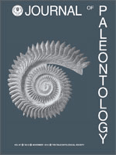
JOURNAL OF PALEONTOLOGY
Scope & Guideline
Advancing Knowledge in Fossil Studies
Introduction
Aims and Scopes
- Paleobiology and Evolutionary Biology:
The journal publishes studies that investigate the biology, ecology, and evolutionary relationships of extinct organisms, often utilizing comparative analyses with modern taxa. - Stratigraphy and Biostratigraphy:
Research related to the distribution of fossils within rock layers, including studies that provide insights into the geological history and paleoenvironmental conditions of different time periods. - Paleoecology:
Papers that explore ancient ecosystems and the interactions between organisms, including their responses to environmental changes and extinction events. - Morphology and Functional Analysis:
The journal features studies that analyze the physical structures of fossils, including their morphology, functional adaptations, and implications for understanding evolutionary processes. - Taphonomy and Fossilization Processes:
Research focusing on the processes of fossilization, including the conditions that promote or inhibit preservation, as well as studies on the biases introduced by these processes. - Taxonomy and Systematics:
The journal emphasizes systematic paleontology, including the description of new species and genera, as well as revisions of existing taxa based on morphological and molecular data.
Trending and Emerging
- Digital Paleontology and Imaging Techniques:
The use of advanced imaging techniques, such as micro-CT scanning and 3D modeling, has gained traction, allowing for detailed analyses of fossil morphology and taphonomy without destructive sampling. - Ediacaran and Early Paleozoic Research:
Research focusing on Ediacaran biota and early Paleozoic organisms is on the rise, reflecting a growing interest in the origins of multicellular life and the early evolutionary history of complex organisms. - Climate Change and Extinction Events:
Studies linking paleontological records to modern climate change and past extinction events are becoming increasingly relevant, as researchers seek to understand the biological responses to environmental shifts. - Integrative Approaches:
There is a trend towards interdisciplinary research that combines paleontology with genomics, ecology, and geochemistry, providing a more holistic understanding of evolutionary processes. - Functional Morphology and Evolutionary Developmental Biology (Evo-Devo):
The exploration of functional morphology in conjunction with evolutionary developmental biology concepts is emerging, revealing insights into how developmental pathways influence the evolution of form and function.
Declining or Waning
- Invertebrate Paleontology:
There has been a noticeable decline in focus on certain groups of invertebrate fossils, such as specific mollusks and brachiopods, possibly due to a shift towards more vertebrate-centric research. - Fieldwork Studies:
Research based solely on fieldwork and descriptive studies of fossil localities has waned, with a trend towards more data-driven and analytical approaches utilizing advanced technologies. - Paleoanthropology:
The coverage of human evolution and related studies appears to be less frequent, as the journal increasingly prioritizes broader paleontological topics over specific anthropological findings. - Paleobiogeography:
While still present, studies specifically focused on paleobiogeographical patterns seem to be less emphasized in recent issues, potentially overshadowed by more integrative approaches that combine multiple disciplines.
Similar Journals

Swiss Journal of Palaeontology
Bridging Science and History in PaleontologySwiss Journal of Palaeontology, published by SPRINGER INT PUBL AG, stands as a leading platform for innovative research within the field of paleontology, contributing significantly to the understanding of Earth's historical life forms and their evolutionary pathways. With its ISSN 1664-2376 and E-ISSN 1664-2384, this journal has established a strong presence in academic circles, recognized as a Q1 journal in the category of Paleontology for 2023. Moreover, it ranks 20th out of 113 in the Earth and Planetary Sciences, securing an impressive 82nd percentile on Scopus, underscoring its influence and reach in the scientific community. The journal publishes cutting-edge research findings, theoretical advancements, and comprehensive reviews that span the globe, making it an essential resource for researchers, professionals, and students in the paleontological sciences. For those interested in contributing to and learning from the latest discoveries, the Swiss Journal of Palaeontology promises to be an invaluable addition to your academic library.
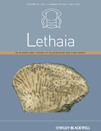
LETHAIA
Innovating Insights into Evolution and EcologyLETHAIA, an esteemed journal published by Scandinavian University Press - Universitetsforlaget AS, serves as a vital platform for the dissemination of innovative research in the fields of paleontology as well as ecology, evolution, behavior, and systematics. Established in 1968 and continuing its impactful journey until 2024, LETHAIA has consistently contributed to advancing scientific understanding of Earth's biological and geological history. With a 2023 impact factor placing it in the Q2 category for both Paleontology and Ecology, Evolution, Behavior and Systematics, the journal is recognized for its high-quality, peer-reviewed articles that engage and challenge the academic community. Researchers, professionals, and students alike will find LETHAIA to be an indispensable resource for the latest findings, methodologies, and theoretical advancements in these interlinked disciplines.

PALAEONTOLOGIA ELECTRONICA
Empowering Scholars with Unrestricted Access to Fossil DiscoveriesPALAEONTOLOGIA ELECTRONICA is a distinguished open-access journal published by COQUINA PRESS, offering a vital platform for the dissemination of cutting-edge research in the fields of Paleontology and Oceanography. Launched in 1998, this journal has continuously fostered scholarly communication, allowing unrestricted access to scientific findings and contributing significantly to the advancement of the field. With an impressive track record since its inception, PALAEONTOLOGIA ELECTRONICA holds a 2023 Scopus ranking of #39 out of 113 in the Paleontology category, demonstrating its value among academic resources as evidenced by its Q2 quartile ranking. The journal is based in the United States, and it encourages submissions that span a diverse range of topics, from fossil analysis to evolutionary biology. As a prominent resource for researchers, educators, and students alike, it plays a crucial role in shaping the future of paleontological study.
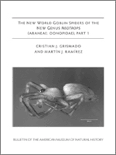
BULLETIN OF THE AMERICAN MUSEUM OF NATURAL HISTORY
Connecting scholars to the latest in natural history advancements.BULLETIN OF THE AMERICAN MUSEUM OF NATURAL HISTORY, published by the American Museum of Natural History, represents a cornerstone of scholarly communication in the fields of Agricultural and Biological Sciences and Ecology. With an impressive impact factor highlighted by its Q1 quartile rankings in both categories, the journal publishes high-quality, peer-reviewed research that significantly contributes to the understanding of natural history. Researchers will find this journal indispensable as it covers a diverse range of topics, providing insights that drive ecological research and biological discovery forward. Although not open access, the Bulletin is widely available through institutional subscriptions, making it accessible to both established professionals and students eager to stay informed about the latest advancements in the field. Its commitment to advancing knowledge from 1996 to the present ensures that it remains relevant and highly regarded within the scientific community.

STRATIGRAPHY AND GEOLOGICAL CORRELATION
Charting the Course of Geological DiscoverySTRATIGRAPHY AND GEOLOGICAL CORRELATION is a prominent scholarly journal published by PLEIADES PUBLISHING INC, featuring a dedicated focus on the fields of geology, stratigraphy, and paleontology. With ISSN 0869-5938 and E-ISSN 1555-6263, this journal has been disseminating significant research findings since its inception in 1994, continuously contributing to the academic discourse through 2024. Despite not currently offering open access, its relevance is underscored by its Category Quartiles for 2023, where it has established itself as Q3 in Geology and Paleontology, and Q2 in Stratigraphy. STRATIGRAPHY AND GEOLOGICAL CORRELATION ranks #29 out of 55 in Stratigraphy and #186 out of 321 in Geology according to Scopus metrics, positioning it within the competitive landscape of Earth and Planetary Sciences. Researchers, professionals, and students are invited to engage with the journal’s content to deepen their understanding and foster innovation within these critical areas of study.
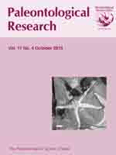
PALEONTOLOGICAL RESEARCH
Unveiling Earth's Ancient Secrets.PALEONTOLOGICAL RESEARCH, published by the PALAEONTOLOGICAL SOCIETY OF JAPAN, is a prominent peer-reviewed journal that addresses key developments in the field of paleontology, ecology, and evolutionary biology. With an ISSN of 1342-8144, this journal has established itself as a vital resource for researchers and professionals who seek to explore the intricate history of life on Earth, integrating insights into evolutionary dynamics and ecological frameworks. Operating since 1997 and with content converging up to 2023, PALEONTOLOGICAL RESEARCH occupies a notable position, ranked in the second quartile within both Ecology, Evolution, Behavior and Systematics and Paleontology categories. While it is not an open-access journal, its rich repository of studies significantly contributes to the academic community. Researchers and students engaged in the exploration of ancient ecosystems and their implications for current biodiversity are sure to find valuable insights within its pages, reinforcing the journal's importance as a leading platform for disseminating paleontological knowledge in Japan and beyond.
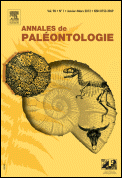
ANNALES DE PALEONTOLOGIE
Unearthing the Past, Shaping the FutureANNALES DE PALEONTOLOGIE is a distinguished academic journal published by MASSON EDITEUR that plays a pivotal role in the field of paleontology. With an ISSN of 0753-3969 and an E-ISSN of 1778-3666, this journal has been a vital resource since its inception in 1988, continuously contributing to the advancement of knowledge in Earth and Planetary Sciences, particularly focusing on paleontological research. Currently ranked #68 out of 113 in its category by Scopus, and celebrated for its Q2 quartile standing, ANNALES DE PALEONTOLOGIE publishes innovative studies, reviews, and discussions that appeal to a diverse audience of researchers, professionals, and students. The journal aims to foster a deeper understanding of paleontological phenomena and encourages interdisciplinary collaboration within the scientific community. Although it is not an open access journal, its commitment to scholarly excellence ensures that the content is highly regarded and widely referenced in academic circles. Situated in Issy-les-Moulineaux, France, it continues to maintain a global readership while promoting significant advancements in paleontological research.
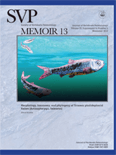
JOURNAL OF VERTEBRATE PALEONTOLOGY
Pioneering Discoveries in Vertebrate PaleontologyJOURNAL OF VERTEBRATE PALEONTOLOGY, published by Taylor & Francis Inc, is a premier academic journal dedicated to advancing the field of vertebrate paleontology. With a strong emphasis on both traditional and innovative research methods, this journal provides a platform for the dissemination of influential studies and discoveries that shape our understanding of vertebrate evolution and their ecological contexts. Operating under an ISSN of 0272-4634 and an E-ISSN of 1937-2809, it covers research published since 1981 and aims to foster a collaborative environment for researchers, professionals, and students alike. The journal is currently ranked in the Q2 category of Paleontology, standing at position #45 among 113 in its Scopus category, which underscores its significant contribution to the academic community. As a crucial resource for scholars, JOURNAL OF VERTEBRATE PALEONTOLOGY provides insights that not only enrich academic discourse but also stimulate further research and exploration in a field that bridges biology, geology, and conservation.
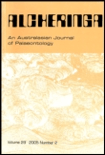
ALCHERINGA
Fostering Insights in Ecology, Evolution, and BeyondALCHERINGA, published by Taylor & Francis Ltd, is a distinguished academic journal that has been at the forefront of research in the fields of ecology, evolution, behavior, systematics, and paleontology since its inception in 1975. With an ISSN of 0311-5518 and E-ISSN 1752-0754, this journal serves as a critical platform for the dissemination of high-quality research, contributing significantly to the understanding of biological and geological sciences. Ranking in the Q3 quartile for both Ecology, Evolution, Behavior and Systematics, as well as Paleontology, ALCHERINGA is well-positioned within the academic community, attracting submissions from researchers across the globe. The journal's Scopus ranks further highlight its relevance, particularly its position in the 51st percentile for Ecology and the 50th percentile for Paleontology. Although it does not operate under an open access model, ALCHERINGA remains committed to providing valuable insights and fostering discussions that are essential for the advancement of these vital scientific disciplines. Researchers, professionals, and students are encouraged to explore the profound implications of the studies published within, making it an indispensable resource for anyone aiming to deepen their expertise in these fields.
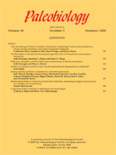
PALEOBIOLOGY
Bridging the Gap Between Past Life and Present UnderstandingPALEOBIOLOGY, published by Cambridge University Press, is a premier, peer-reviewed journal that stands at the forefront of research in paleontological sciences. With a robust commitment to advancing the study of the interactions between ancient life forms and their environments, the journal has established itself as a vital resource for researchers, professionals, and students in the fields of paleontology, ecology, and evolutionary biology. Spanning from 1975 to 2024, it boasts an impressive Q1 ranking in several categories, including Agricultural and Biological Sciences, Ecology, and Paleontology, indicative of its high impact and relevance in shaping contemporary scientific discourse. While the journal is not open access, it offers a variety of subscription and access options, ensuring broad distribution and visibility of published research. As a leader in its discipline, PALEOBIOLOGY aims to facilitate a deeper understanding of our planet's biological history, making it an essential publication for anyone interested in the dynamics of life across geological time.